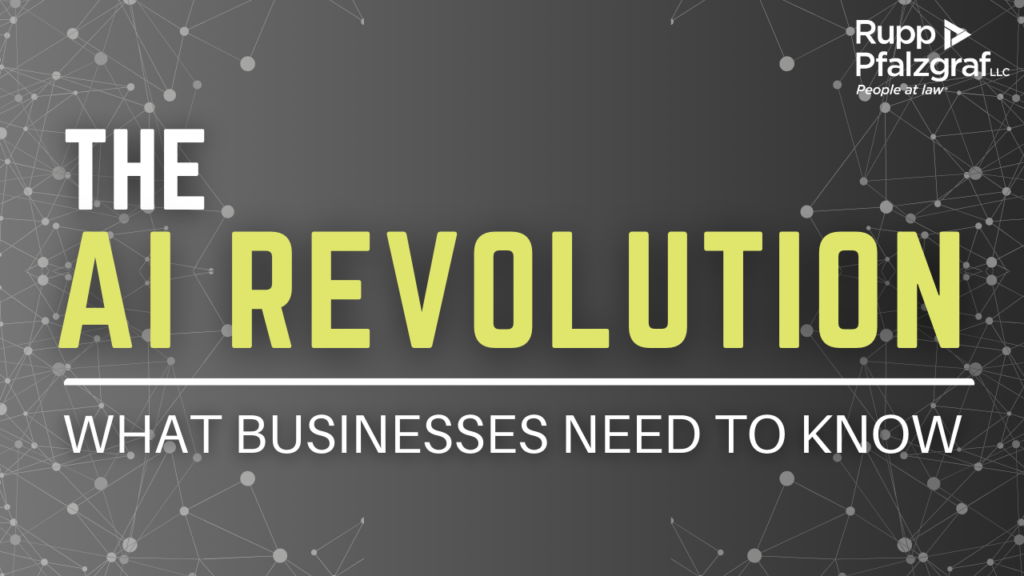
By: Amedeo Zmarandoiu
Artificial Intelligence (AI) is rapidly transforming the business landscape, offering unprecedented opportunities for innovation and efficiency. However, with these opportunities come new legal and regulatory challenges that businesses must navigate carefully.
Our team of national and international attorneys at Rupp Pfalzgraf LLC have been closely monitoring the evolving AI landscape and its implications. This briefing aims to provide key insights and practical guidance to help your business thrive in the AI era while staying compliant with emerging regulations.
The Regulatory Tidal Wave
U.S. Federal and State Initiatives
Businesses today face a complex and rapidly changing regulatory environment when it comes to AI. While the U.S. federal government has yet to pass comprehensive AI legislation, President Biden’s Executive Order 14110 on AI, signed on October 30, 2023, set the stage for future regulations. Meanwhile, states are taking matters into their own hands. In just the first four months of 2024, nearly every state has introduced AI-related bills, covering everything from transparency in AI-generated content to protections against algorithmic discrimination.
Examples of Proposed Legislation
- New York S.B. 7847 and S.B. 7922 are considering laws requiring disclosure when generative AI is used to create content like books or news articles.
- Washington S.B. 6073 may soon require lawyers to disclose their use of AI in legal research and document drafting.
- Georgia H.B. 890 and Hawaii H.B. 1607 are working to incorporate AI considerations into existing anti-discrimination laws.
This patchwork of state regulations means businesses operating across multiple states may soon need to navigate a complex web of compliance requirements.
Key Business Considerations
Risk Assessment
With the EU’s AI Act on the horizon and similar frameworks likely to follow in other jurisdictions, businesses need to start classifying their AI systems based on risk levels, with high-risk AI applications facing stricter regulations.
Transparency and Disclosure
Many proposed laws focus on transparency. For instance, Florida H.B. 1459 would require clear disclosure if an AI mechanism is used for commercial communication. Be prepared to disclose when and how you’re using AI, especially in customer-facing applications.
Data Protection and Privacy
AI systems often require large amounts of data to function effectively. Ensure your data collection and usage practices comply with existing privacy laws like the GDPR and CCPA and anticipate stricter regulations to come.
Intellectual Property Concerns
The use of AI in content creation is raising new questions about copyright and ownership. The U.S. Copyright Office has stated that AI-generated works without human authorship are not copyrightable. Be cautious about using AI-generated content without understanding the potential legal implications.
Employment Practices
If you’re using AI in hiring, promotion, or other employment decisions, be aware of the growing focus on preventing algorithmic discrimination. The U.S. Equal Employment Opportunity Commission (EEOC) has issued guidance on how AI tools may violate anti-discrimination laws.
Practical Steps For Businesses
Develop an AI Governance Framework
Establish clear policies and procedures for AI development and use within your organization. The National Institute of Standards and Technology (NIST) AI Risk Management Framework can be a helpful resource in this regard.
Conduct Regular Audits
Regularly assess your AI systems for potential biases, security vulnerabilities, and compliance with evolving regulations.
Enhance Transparency
Be proactive in disclosing AI use to customers and stakeholders. This builds trust and may help you get ahead of future regulatory requirements.
Invest in AI Literacy
Ensure your team, especially those in leadership positions, understand AI basics and its implications for your business. Consider training programs or workshops on AI ethics and governance.
Stay Informed
The AI landscape is changing rapidly. Make it a priority to stay up-to-date on new developments in AI technology and regulation. Resources like the AI Index Report from Stanford University can provide valuable insights.
The Road Ahead
The AI revolution presents both unprecedented opportunities and significant challenges for businesses. Those who proactively address the legal and ethical implications of AI will be better positioned to harness its benefits while minimizing risks.
At Rupp Pfalzgraf, we’re committed to helping our clients navigate this complex landscape. Our team of expert attorneys stays at the forefront of AI-related legal developments, ensuring we can provide timely, practical advice tailored to your business needs.
Remember, the key to success in the AI era is not just adopting the technology but doing so responsibly and in compliance with the evolving legal landscape. By taking proactive steps now, you can position your business to thrive in the AI-driven future.
How We Can Help
Navigating the complex world of AI regulation can be daunting, but you don’t have to do it alone. Whether you’re just beginning to explore AI implementation in your business or dealing with specific legal challenges related to AI, our team is here to help.
We offer tailored legal advice on AI governance, regulatory compliance, risk assessment, and more. If you have questions about how AI regulations might affect your business, or if you need assistance in developing AI policies and procedures, don’t hesitate to reach out. Contact us today to schedule a consultation and ensure your business is prepared for the AI revolution.
About The Author: Amedeo Zmarandoiu is an international attorney with a unique academic foundation, holding a JD from the University of Bologna, Italy (‘18), and an LLM from the University at Buffalo, New York (’24). Admitted to practice in Italy and currently seeking admission to the New York Bar, Amedeo integrates both European and American legal perspectives in his work at the firm. With experience in both private practice and as in-house counsel, he navigates complex legal landscapes while staying at the forefront of developments in artificial intelligence (AI) law, focusing on emerging trends in technology, privacy and compliance.

